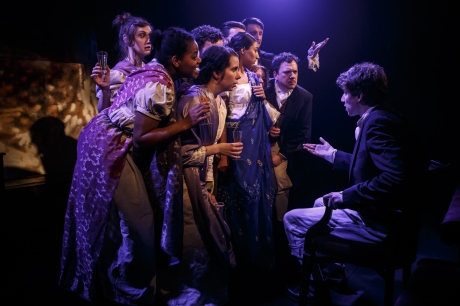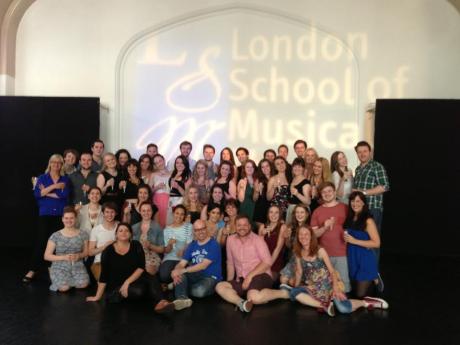“…Applause! Applause!”
Three years ago (*gulps*) I was performing in my graduating show ‘Applause’ at LSMT. At the time I adored the title song (well, I still do) and I thought that the lyrics perfectly reflected what working as an actor would be like. It talks about how through all of the hardship (“your bank account’s bare”, “you’re thinking you’re through”, “you’re losing your hair”) that the sound of applause will be all you need to keep yourself going. That the validation of applause is all we actors need to live a happy existence. No, Ridout. That’s obviously not the case. I’d like to think I’ve always known that it takes more than people meeting their hands together in appreciation of some work you’ve done to find happiness. I’d also like to think that I’m very good at keeping content in times of funemployment. However, it’s become apparent that I’m not very good at sorting out my priorities – I didn’t foresee that being in work (and having people clap at me) would play a big part in my unhappiness. The past two months have taught me that. This industry can take so much from us and, like Denise Gough in her Honest Actors podcast (found here), I’m not going to give it more of my life than is necessary anymore.
“Work is not my life. My life is my life. Work is part of my life” – Denise Gough
Let me explain…
This industry ingrains in everyone a pre-historic message that, come rain or shine, come hell or high water, that the show must go on. Pressures to make this happen come from producers and audience members alike. This leaves us, the performers, caught between a rock and a hard place. Consequently, it’s so easy to not make a move at all – to stay silently still – and pay the price personally later. It’s something that’s been heavily featured in the industry (and also reached general) news recently and I’ve now found myself in a situation where I have an experience to add to the discussion. In case you missed the news (I’d be surprised as so many papers joined in to add fuel to the fire), there was uproar when Sheridan Smith announced that she would be missing a performance of ‘Funny Girl’ at the Menier Chocolate Factory. Instantly, thanks to the immediacy of Twitter, there were disgruntled ticket holders* demanding refunds not only for their tickets but also for their travel costs because they wanted to see her – evidently not the wonderful piece of musical theatre that ‘Funny Girl’ is.
*Now, I won’t get into the rights and wrongs of people wanting refunds/exchanges for shows because of their “star” billing in this blog. That would open a Sunset Boulevard can of worms that I don’t quite have the energy to take on. It’s just important to acknowledge that the audience applied a lot of pressure for the purpose of this post.
The producers worried about the implications of Sheridans absence on the finances of the show – after all, the Menier is a small theatre! In a tweet that was later deleted, Sheridan named the producers and stated how they were “desperately” trying to get her back for the next show, putting pressure on her and not giving a f*ck about her situation.This was all despite the fact that Sheridan had an understudy.
Understudy: to study or know a role as to be able to replace the regular performer in case of need.
In a “normal” job, your rights state that you are entitled to time off to deal with an emergency involving a dependent (your father falling ill, for example). Sheridan wanted, and understandably needed, time off following the news of her Dad’s cancer diagnosis. That’s a cause for need of an understudy if you ask me. The ‘Funny Girl’ producers later released a statement in support of Sheridan’s decision to take time off the show but it seems that paying audience members still didn’t share the same understanding and acceptance – despite it being her right, putting human compassion aside.
Thankfully, Sheridan has a brilliant understudy in Natasha Barnes (who has previously contributed to this blog – if you can guess her entry) who could step in, in Sheridan’s time of need. I was ecstatic to see the responses she was receiving from the public for her performance as Fanny Brice. Isn’t it amazing that actors can take time off and someone else can keep the show running to critical acclaim!? Huzzah for understudies!
Sometimes though, even if one of the pressures to go on is removed (eg. the producers don’t mind because you have an understudy), as actors we put a pressure on ourselves to soldier through regardless. Actors have an instinct – a unique dread – that they could be letting their loving public down or doing their professional reputation a disservice if they don’t just grin and bear it. It’s a complaint among older actors that the younger generation don’t have the same do or die attitude that they had. (Tangent: I’d be interested to know statistically if – in thirty years – more actors from our generation keep going until later in life because they’ve taken better care of themselves. See ya in 30 years for that follow up blog.) Left to our own devices (or with an inadvertent fear that your understudy may do a better job than you) actors so easily get their priorities all wrong and choose the limelight over their life.
In his book, ‘The Rules of Acting’, Michael Simkins shares his story of how he learnt this lesson the hard way. Michael would happily, and often, boast that he’d barely missed a performance in his 25 years as a jobbing actor. It was then during a run of ‘The Old Masters’, in which he played a cameo role, that his mother went into permanent care. Then, one Friday afternoon, he was told she’d fallen unwell. Despite worsening bulletins all of Friday evening and Saturday, he clung to the notion of completing his two shows. “For reasons that still haunt me, I resolved to stay on and do my one small scene in the evening”. In his journeying to visit his mother after the show she died just minutes before his arrival. He’s now vowed to never let a performance get in the way whenever real life needs prioritizing.
I had read this story years ago (clearly some things don’t stick until you experience them yourself – take heed!) but was reminded of it by my colleague whilst working on ‘Princess Caraboo’ at the Finborough. Her husband was the “perfectly capable understudy” Michael spoke of in his book and what isn’t included in the anecdote is that Simkins went onto miss numerous performances because his experience had left him so distraught. We can suffer more in the long run (and miss more performances) by failing to face up to circumstances and bring brave enough to say “I need this break”. Sarah was telling me this story because during our run, my Gramps was hospitalized. In Michael or Sheridan’s situation I’d have been home like a shot but I was stuck through my circumstances. ‘Princess Caraboo’ was a no-contract, profit-share agreement and we had the bare minimum in cast numbers – meaning no understudies. With other small casts I’ve worked with we’d joke about what would happen should one of us fall ill. “Well, if you’re still in control of your bodily functions and can run into the wings to be sick rather than centre stage then you’re good to go on”. Indeed, when I was in Sound of Music, because cast changeovers mid-contract, we were left with no spare male understudies and so my colleague had to go on whilst suffering with a painful (and noticeable) abscess in his mouth. He had to sing…with an abscess. Crazy, I know. I’ve also known of performers who have been seriously injured performing in a show, undergone surgery, and then still had pressures from the powers that be to get back on stage quicker than the usual recovery time (understudies cost more – lest we forget #coverfee). It’s only when someone physically cannot make it onto stage that a show with no understudies has to be cancelled. Naively (or stupidly), I didn’t feel like emotional trauma fit the “I deserve a break” bill and so I let Doctor Theatre* cure me whilst my family came together, counties away, to support eachother. .
*Doctor Theatre/Doctor Footlights: name given to the magical healing that happens to an actor when they are struck down by illness or infirmity and still have a show to get through. Endorphins (and the validation of applause) take over and numb out he pain and/or stress.
One of the (many) difficulties with Fringe work is that because you’re not being paid, part of you thinks “well, I’m not being paid for this so screw it, I’m going home!” whilst the other part of you shares such a strong camaraderie with your fellow performers that you don’t want to deny them a show and deny them the opportunity to earn more profit. Plus, I was struggling so much financially that I couldn’t realistically afford a day off work, let alone a train fare home. I was caught between a very hard rock and a very hard place, in the middle of London.
Then, in the penultimate week of the show, sadly my Gramps passed away. (Apologies, I know this is very heavy for a whenindoubt blog but writing about it has been incredibly helpful for me and it may help someone else). I hadn’t made it down to see him in his final days but that wasn’t what made it hard (some family members even envied my position because my lasting memory of him was a relatively healthy and happy one). It was the fact that I couldn’t get home to be with my family to deal with it all that made it so difficult. I was a mess. People can attest to that fact. I can’t count the number of times I would be crying backstage and pull myself together just in time to step into the lights. People would tell me “your Gramps would want you to be performing, doing what you love”. Indeed, Sheridan also said that her Dad had wanted her to get back on – it’s her escapism. I think that’s essentially what makes the idea of Dr Footlights stick. It’s that acting is escapism for us. You’re not being yourself for two and a half hours. You don’t have your problems (or your cold, or your pulled hamstring). Then you hear applause and you think “that was worth it”…until you’re home and alone with the repercussions. Burying your problems like that repeatedly takes its toll eventually. Trust me.
To add a cherry on top of this sundae of a situation, I was also auditioning for a West End show at the time and had a final two days (and four shows) after my Gramps’ passing. This was another example of how I gave perhaps a bit too much to the industry in a time that I really needed to be looking after myself (and my family). I know “what if”s would have haunted me should I have pulled out of the process at that stage but I’m not sure soldiering on was the best decision either. I was looking at the world through a dark, murky cloud (and puffy eyes). I couldn’t focus on any tasks properly – even making a cup of coffee involved copious mental distractions. How I expected to do myself justice and perform to my best ability I have no idea. It’s hardly surprising to note that I didn’t do my best and I didn’t get the job. What I had done though was genuinely pause my mourning and I came crashing back into reality so much harder as a consequence.
I don’t really know what the answer in this situation is – any opinions would be welcome! Do we cancel potentially career changing auditions? Do we hire swings for every show? Do we allow ourselves/our colleagues to cancel shows – no matter what the result could be for others involved? I’m pretty sure that there is no black and white answer. What is clear to me though is that we need to prioritize ourselves over our work some of the time (I’m not saying always. You can be the judge of when it’s necessary). We shouldn’t be slaves to what we do or allow anyone else to let us think that we can’t make that decision for ourselves. These were examples where we need to exercise our right to avoid additional sadness. However, there are plenty of examples of how, as performers, we also miss out on things that would just add joy to our lives. I – and many others – have missed weddings (one was whilst I working in Edinburgh and we played to an audience of approximately 6 people that night. Hindsight tells me we could have cancelled the show). I’ve also recently missed drastic changes in the development of my baby brothers. Waiting eight weeks to see babies when you know they’re smiling, laughing and growing ridiculously fast is tough. Plus, baby cuddles are very useful in a time of mourning – circle of life and all that jazz. I feel very lucky (I always find a silver lining) that I’ve had this heartache and moment of realisation only three years into my career – rather than Simkins twenty-five. I can now remain aware of my priorities and will hopefully not have to endure what I’ve experienced these past two months again. All I can advise is: if you have an understudy, just go. Also, it might seem overly precautious but if you know someone close to you who is ill, think seriously before taking a fringe job – ensure that you wont get stuck between a rock and a hard place if you do. Make sure you’re putting your life and your well-being first. I know for a lot of us, we derive the majority of our happiness from performing. Applause does, indeed, make our hearts happy. Just know when to step back. Sometimes a night out of the lime light will make you much happier in the long run.
Happy doing-a-Hermione* and sorting out your priorities!
*In case you aren’t a die-hard Harry Potter fan (who are you!?) then this is referencing an exchange in Harry Potter and the Philosophers Stone:
Hermione: Now if you two don’t mind, I’m going to bed before either of you come up with another clever idea to get us killed – or worse, expelled.
Ron: She needs to sort out her priorities!

Whilst doing this, I was missing…

…this. That’s happiness. Right there.
“Why kick up your legs, when draining the dregs of sorrow’s bitter cup? Because you have read some idiot has said “the curtain must stay up”!
– Rebecca Ridout














